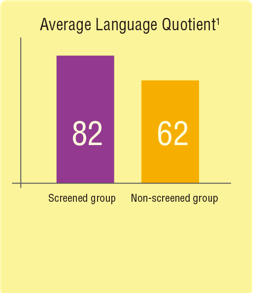

EarScreen
Protect your child from childhood
hearing loss!
Why is hearing important to children?
Hearing is important to speech and language development and to learning. Checking your child’s hearing early can help prevent potential hearing issues such as delayed speech and learning development, a child’s confidence and social skills.
Protect your child from childhood hearing loss
Children who pass their newborn hearing test can still be at risk of having delayed-onset1 or acquired hearing loss in early childhood2. Leading causes of acquired hearing loss include infectious disease such as meningitis, trauma to the nervous system, damaging noise levels or ototoxic drugs3.
A cohort study in the UK involving 32,000 school age children has shown that up to 50% of children identified with hearing loss at school age have passed newborn hearing screening4. It’s important to have your child’s hearing screened regularly as any undetected hearing problem in children may result in lifelong deficits in speech and language acquisition, poor academic performance, personal-social maladjustments, and emotional difficulties3.

Checking your child’s hearing early can help prevent potential hearing issues such as delayed speech and learning development, a child’s confidence and social skills.
How do we screen?
Earscreen™ is as easy as listening to a lullaby. The entire process only takes about five minutes to complete and results will be made known to you on the same day.
Step 1
Online registration via earscreen.cordlifetech.com
Step 2
Pre-screening verification upon arrival at clinic
Step 3
Visual inspection via Otoscopy
Step 4
Screen with a paediatric ear probe
Step 5
Your child’s hearing screening result will be shared with you on the spot
References
- The (U.S.) Joint Committee on Infant Hearing. Year 2019 Position Statement: Principles and guidelines for early hearing detection and intervention programs. The Journal of Early Hearing Detection and Intervention. 2019; 4(2): 1-44.
- American Academy of Audiology. Childhood hearing screening guidelines. September 2011. Available from: http://www.cdc.gov/ncbddd/hearingloss/documents/AAA_Childhood%20Hearing%20Guidelines_ 2011.pdf. Accessed 31 Aug 2021.
- Jennifer S. Bush. AAP issues screening recommendations to identify hearing loss in children. Am Fam Physician 2003, Jun 1; 67(11): 2409-2413. Available from: http://www.aafp.org/afp /2003/0601/p2409.html. Last Accessed on 31 Aug 2021.
- Watkin P and Baldwin M. The longitudinal follow up of a universal neonatal hearing screen: The implications for confirming deafness in childhood. International Journal of Audiology. 2012; 51:519–528.
